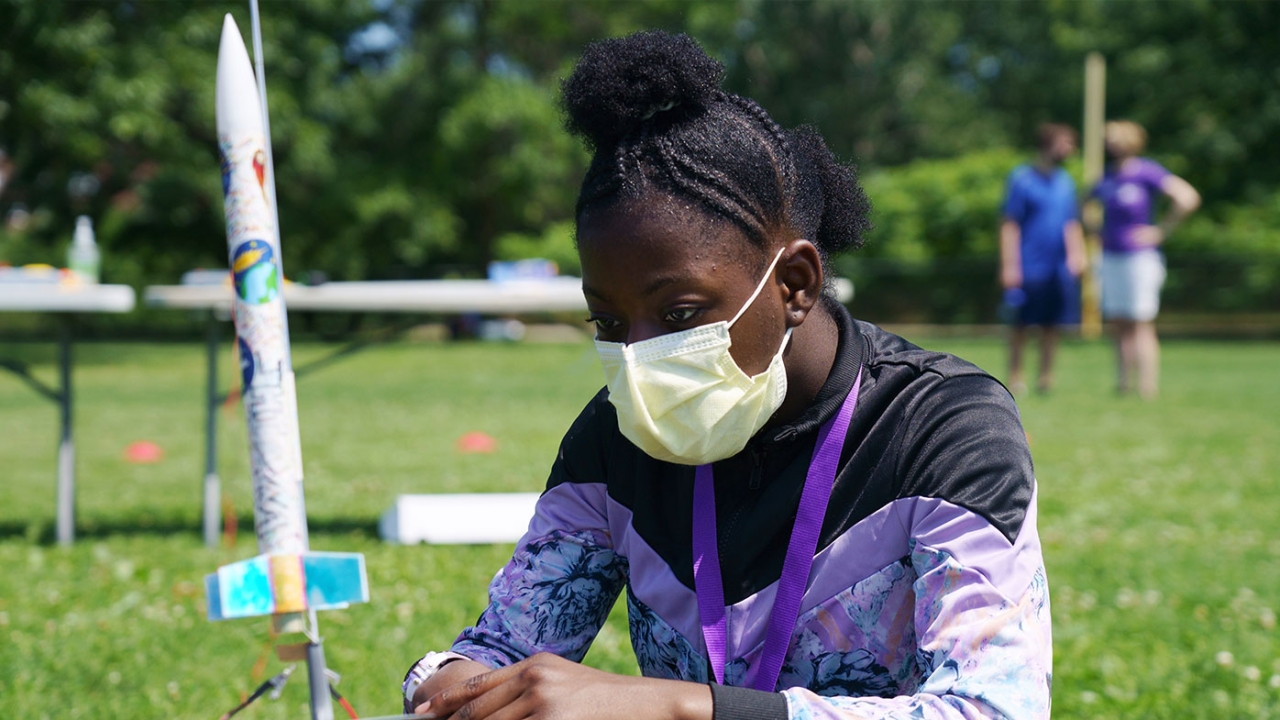SOURCE: Bristol Myers Squibb Company
DESCRIPTION:
“I never questioned my goal of becoming a Black neuroscientist because I had already met one, and for that, I am forever grateful,” said Kaelyn Brown, who first joined the Science Club for Girls (SCFG) at six years old. She continued the program throughout her youth, became a SCFG mentor during college and served as the co-director of the Harvard University Mentor Chapter. Recently graduating from Harvard with a degree in neuroscience, Brown credits her early exposure as critical to her pursuit of a career in science.
SCFG was founded in 1994 to foster excitement, confidence and literacy in STEM for girls and gender-expansive youth from historically underrepresented communities with free, experiential community-based programs. The organization offers a wide array of opportunities through its hands-on programming and ensures that diverse mentors are available to serve as role models for the students, which helps them visualize a future career in STEM.
As a way of eliminating access barriers, SCFG’s clubs are free for anyone interested in learning more about the field, which paves the way for a diverse and equitable future of STEM. Across its programs, 75 percent of the girls and over 50 percent of mentors are from backgrounds historically underrepresented in STEM.
Bringing STEM to schools
Bristol Myers Squibb is committed to educating, hiring and inspiring a new generation of physicians and scientists from historically underrepresented communities and addressing serious gaps in care facing patients from these communities. To honor that commitment, in 2020, the company signed on as a sponsor of SCFG to fully fund all aspects of running a science club, providing two full semesters per year of free, mentor-led and hands-on STEM programming to eight girls in grades K to 8 and two junior mentors in grades 9 to 12. With the support of partners like Bristol Myers Squibb, SCFG brings STEM to schools and community centers during after-school programs and on weekends and introduces scientific concepts to students at a young age when they are most curious. Ultimately, these programs nurture their passion for STEM while putting them in a position to pursue a career in the field.

Photo: Science Club for Girls scientist, Jhianna, examining her rocket before its launch
Over the last 12 years, 90% of the program’s high school juniors and seniors have gone to college, and of those girls, 55% have chosen to major in STEM. As part of that 55%, Kaelyn says the program served as a great inspiration that shaped her future aspirations. Additionally, the program allowed her interest in science to flourish while providing mentors that looked like her. “Science has always been, and will always be, for everyone,” Brown said.
Sharing with the next generation
The SCFG partnership also gives Bristol Myers Squibb scientists the opportunity to share their knowledge and expertise with the next generation of scientists. In the spring semester of 2021, Shana Walrond, senior research scientist, was one of the company’s volunteers who met with students every week for eight weeks, mentoring them and leading experiments. Numerous other company volunteers sat on panels to discuss their careers and lessons learned along the way or helped pack science kits with materials and instructions for kids to participate in virtual programming. Despite switching to a virtual format due to the pandemic, the organization expanded its reach to more audiences, growing to 350 participants in the past year.
Walrond’s motivation to volunteer with SCFG centers on her desire to give back to her community. Growing up in Cambridge, she too participated in local universities’ mentorship programs that exposed her to science.
“Looking back at myself at that age, those programs inspired me to pursue a career in STEM because they gave me the confidence that I was smart enough to succeed in the field. Coming from an immigrant family, they also helped me realize that there were people in STEM jobs who looked like me, which helped me see a future in STEM,” said Walrond.
For Walrond, the most exciting and rewarding part of participating in SCFG’s program is that it shows her what the industry’s future will look like, full of women who are insightful, intelligent and willing to share. These girls’ dedication to furthering their skillset goes beyond lessons, and parents have taken notice of their hard work at home. One of her mentees, Fatimah, told her mom that she “uses her imagination during the program and feels like a scientist, and her home is her lab.” According to her mother, even after Zoom lessons conclude, Fatimah continues to work on the day’s project or she’ll start a new building a new one on her own. The girls’ dedication to learning from this program amazes Walrond every day as she knows the future is in good hands.
Learn more about Bristol Myers Squibb here
KEYWORDS: NYSE: BMY, STEM, Science Club for Girls (SCFG), Harvard University Mentor Chapter, DEI








